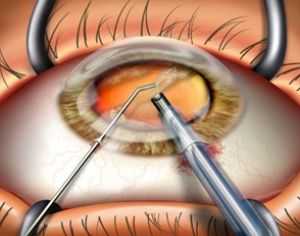Related Topics
Dislocations: Financial and Fundamental
The crash of 2007 was more than a bank panic. Thirty years of excessive borrowing had reached a point where something was certain to topple it. Alan Greenspan deplored "irrational exuberance" in 1996, but only in 2007 did everybody try to get out the door at the same time. The crash announced the switch to deleveraging, it did not cause it.
Philadelphia Medicine (2)
Philadelphia is where medicine began in America
Old Age, Re-designed
A grumpy analysis of future trends from a member of the Grumpy Generation.
Cataracts and Deference to Seniors
Last week I had a cataract extraction; it went well. I now see like an eagle, there was no pain at any time, and it only interrupted my life for about six hours, including travel time. While I suppose there is a chance of complications during the next month after surgery, I'm an optimist and statistics are on my side. As they say in South Philadelphia, faced about it.

|
| Cataract Extraction |
Those were of course not the serene thoughts I had in advance of the surgery, which carries certain risks. Persons with myopia like me often have a mismatch in the size of their eyeball and the size of the retina inside so the retina can tear or detach during the first few days after the eyeball's integrity has been pierced. The lens can get stuck and break apart as it is being removed, hemorrhage can occur. The surgeon's hand can slip; he can sneeze at the wrong moment. So, bad things could have happened to me, making my twinge of anxiety entirely justified. But that's all behind me now; I even forgot to ask the surgeon what type of lens he intended to implant so I could argue with him. Let the Captain run the ship. I was surrendering my fate to the largest eye hospital in the country. They perform between fifty and a hundred of these procedures every day, and my surgeon is the chief of the cataract department.
And yet, and yet, I have a few grumbles, leading to some generalizations about health care for the elderly. In the first place, I was told by an administrator who sounded terribly fierce that I had to be there at 8:15 AM, in the company of the person who would drive me home, or they wouldn't do my surgery. I told her I doubted that, so we got off to a poor start. The procedure ought to take less than ten minutes to perform, perhaps twenty if you count the formalities. Furthermore, I was a consultant to that hospital once, and still had a certain amount of standing in the Philadelphia medical community, having once been a trustee of almost everything you can be a trustee of. Sure enough, when my driver and I arrived at 8:15, there were more than fifty others waiting. They finally called my name at 1:30 in the afternoon, and by roughly 2 o'clock I was out of there. I was by no means the last one waiting to be called, and it sort of felt as though we were all treated like logs of wood. While I was inside the operating room, a couple of nurses were chattering, and one said she much preferred to work on weekends because there were no administrators around. I could see what she meant.
To keep this essay from sounding like constant whining, let me tell a little of the history of this operation. Until perhaps twenty years ago, a cataract extraction involved keeping the patient in the hospital after the operation with the head in sandbags, for two full weeks. Now, it takes ten or twenty minutes, and you are free to have lunch with a friend in an hour unless you give in to your driver who has been waiting five hours and wants to go home. The results are far superior, and you don't have to wear glasses that look like the bottom of Coke bottles afterward; in fact, I already see pretty well without any glasses before a week is up. In the past, the great fear was a complication known as sympathetic ophthalmitis, in which disturbing the lens of one eye would set up a sort of allergy which could also make you blind in the other, good, eye.

|
| Spitfire |
In the famous Battle of Britain in the Second World War, the British pilots to whom so many owe so much were covered with a plexiglass canopy in a fighter plane called the Spitfire. Enemy machine gun fire would often shatter this canopy, and among a lot of other damages, shards of plexiglass got lodged in the eyeballs of the pilots. For the most part, it was left in place because other injuries needed tending more urgently. Long after the Battle, it finally dawned on a British ophthalmologist that this wasn't supposed to happen, it was supposed to cause sympathetic ophthalmitis and the pilots were supposed to go blind. From this, it was finally deduced that plexiglass was safe to use as a lens implant, a so-called "hard implant". You can still see people walking about with these lenses, recognizable because their eyes seem to glow when the light shines into them, like crocodiles along the Amazon at night.
The second step in the migration to modern cataract surgery was the insight that soft pliable forms of plastic retain a memory of the shape they were molded into. So, the old lens can be scooped, lasered or sucked out of place, and a squeezed-down soft lens can be shoved into the vacated space. Retaining its shape-memory, it springs back into the correct shape for a lens, and you are all set.
And finally, there was the stitch. If you cut into the side of the cornea, you have to stitch it up after you are through. And then later you have to remove the stitch. An eye surgeon who should be more famous if he were more popular then invented a form of curved incision which did not requite a stitch because the pressure within the eye held it closed. It was a simple and brilliant idea, which took scarcely a few extra seconds but eliminated one of those sources of complications which dogged the statistics. There was only one problem. This surgeon decided to apply for a patent for his invention, and the medical world had a fit; not only did he patent the curved incision, but he also sent bills for royalties to every eye surgeon he could prove was using it. I happened to be seated the House of Delegates of the American Medical Association when this matter came up, and the uproar was considerable, including some ribald limericks which were read the House "as a matter of personal privilege". Shortly afterward the courts did the right thing and disallowed the patent.
So that pretty well summarizes how cataract surgery became a modern miracle, with a great many elderly people now playing demon bridge when they would otherwise be fed with a spoon. Somehow, the national gratitude is not quite equal to its obligations, and we hear people grumble that eye surgeons make too much money. When the achievements of politicians match those of the average eye surgeon, perhaps they will have a point. But not sooner.
But I'm allowed to complain, and perhaps obliged to issue a warning to my fellow elders about the true source of our discontent. It seems to start with eye drops, but it's more than that. There's a simple technique for instilling eye drops, which involves pulling down the lower lid, creating a pocket, and putting the drop in the pocket, after which the subject blinks his eye and spreads the drop around. Works slick takes no extra time, and little trouble. And while a half-dozen nurses put drops in my eye, and must put fifty drops in fifty eyes every day, not one of them did it right. The drops were spattered on the eyelids and eyelashes, much of them running down my cheek. One extra-large nurse with an attitude put her thumb on my upper eyelid and spread the lids so painfully apart that I cried out in protest. It's supposed to hurt, was the unwelcome answer. I resolved then, and soon carried out the threat to scold the surgeon and the Physician-in-Chief about the responsibilities of supervision, but there are two other more serious issues behind this indignity.
In the first place, the reimbursement mechanisms were modified so that hospitals were no longer paid for maintaining a school of nursing. Within a few years, all hospitals had trimmed this expense, and nurses went to college to be trained in nursing, miles away from the nearest hospital, and eventually trained by other nurses who had themselves had scant experience with patients. Although it is boasted that they now have bachelor's' degrees instead of mere diplomas, their skill with patient care is far inferior to that of the generations which went before them. Instead of being well trained, they are rule-ridden.
The other underlying issue lies with us, the patients. In France people retire at fifty I hear, and in this country, we retire at sixty-five. But we sit around, essentially quite healthy, until eighty-five or later. Everybody knows we have nothing important to do, so they waste our time. Or rather, whenever there is a choice of wasting a minute of working-person's time or an hour of a retired person's, it is the retired person who is dumped on, and it's only going to get much worse with time. Hey, folks, it's degrading to be so useless. Go to work and accomplish something. Don't let the younger generation treat you like logs of wood.
Originally published: Friday, July 16, 2010; most-recently modified: Sunday, July 21, 2019